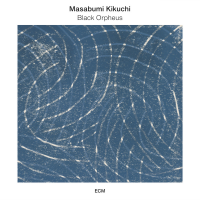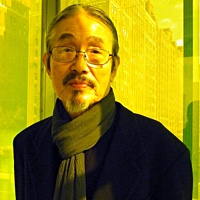Home » Jazz Musicians » Masabumi Kikuchi
Masabumi Kikuchi
Masabumi "Poo" Kikuchi was a Japanese jazz pianist of legendary stature with a vast discography that ran the gamut from straight-up post-bop and vanguard classical to fusion recordings, solo synthesizer dates, and even digital dub.
He toured and recorded with artists as diverse as Sonny Rollins, Lionel Hampton, Terumasa Hino, Sadao Watanabe, and drummer Paul Motian, among others.
Kikuchi was born in Tokyo in October of 1939. He studied music at the Tokyo Art College High School and, upon graduating, immediately formed his own trio. Soon after, he won a spot in Hampton's Japanese touring band. He made his recording debut as a jazz pianist in 1963 on Toshiko Akiyoshi and Charlie Mariano's East & West. Kikuchi played piano on composer Toru Takemitsu's score for a film by Masahiro Shinoda. In 1966 he appeared with Watanabe on the saxophonist's Jazz & Bossa recording, along with iconic drummer Masahiko Togashi. The year 1967 proved to be a prolific one in Kikuchi's career: not only did he appear on no less than five albums recorded with Watanabe and Mariano, but he also appeared with Japan's Swing All Stars. In 1968, along with session work, he and trumpeter Hino formed the Hino-Kikuchi Quintet and recorded their self-titled debut; the album received national acclaim.
Around this time, the pianist also entered a contest for overseas musicians sponsored by Down Beat magazine. He won a full scholarship to the Berklee College of Music in the United States. Before leaving for Berklee, Kikuchi played piano for Rollins during his Japanese tour. The pianist returned to Japan in 1969. In 1970, he was part of Peacock's group on the seminal Eastward album. Kikuchi formed his own sextet right after, and recorded Matrix in 1970; it was the first recording under his own name to see international distribution and is one of his classics. Poo-Sun, which was influenced by the sounds coming from Miles Davis' group of the same period, was issued the same year. All told, Kikuchi's sextet recorded a total of seven albums in 1970, two in collaboration with Watanabe's band. He also appeared on Hozan Yamamoto's Silver World with Peacock.
Between 1970 and 1979, Kikuchi was a well documented as a as a sideman and featured guest, and led several important dates. He recorded and toured with Mal Waldron, Joe Henderson, Elvin Jones,Gil Evans, and Peacock, and cut two duet albums with Togashi, the truly enigmatic Japanese vanguard jazz recordings Poesy: The Man Who Keeps Washing His Hands (1971) and Song for Myself (1974). His own non-sextet dates from the '70s included the enigmatic A Short Story for Image Hairpin Circus (1972), East Wind (1974), Wishes/Kochi (from 1976, featuring members of Davis' group including Reggie Lucas, Steve Grossman, Mtume, Dave Liebman, and Al Foster), and the solo But Not for Me (1978). Kikuchi had become friends with Davis earlier in the decade. He was one of the musicians whom the trumpeter kept in touch with during his retirement, and the two recorded an album together in 1978 that has never been released.
Read moreTags
Producer Sun Chung: Always Listening for a Story

by Tyran Grillo
On April 28, 2021, a quiet masterpiece marked the end of an era--and the beginning of another. Hanamichi was to be the last studio recording of Japanese pianist Masabumi Kikuchi, who died in 2015, two years after its creation. And yet, while its sweeter overtones struck balance in the bitterness of his absence, the album marked the birth of Red Hook Records, an independent label run by producer Sun Chung. Kikuchi's uncanny ability to tell a story was an organic ...
read moreMasabumi Kikuchi: Hanamichi — The Final Studio Recording

by Neri Pollastri
Esce postumo, a inaugurare l'etichetta Red Hook, questo album in solitudine del grande pianista giapponese Masabumi Kikuchi, che molti ricorderanno per le collaborazioni con Gary Peacock (epica quella del 1971, Voices) e Paul Motian, su tutte il formidabile e geniale trio Tethered Moon. Registrato nel 2013, due anni prima della sua scomparsa, il lavoro vede il pianista—allora settantatreenne e già fortemente sofferente e debilitato—misurarsi con uno Steinway su cinque brani: un'improvvisazione, delle quali era maestro, una sua composizione e tre ...
read moreSolo Pianists from Japan

by Jerome Wilson
These are two recent solo piano releases from Japanese players. One is the latest dispatch from a prolific musician. The other is a farewell statement from a deceased artist. Satoko Fujii Hazuki Libra 2021 Satoko Fujii has been amazingly prolific in the last few years, releasing a bevy of recordings in all sort of configurations, from solo piano and duets with her husband, trumpeter Natsuki Tamura, to various small groups and ...
read moreMasabumi Kikuchi: Hanamichi The Final Studio Recording

by Pierre Giroux
Masabumi Kikuchi is not the kind of jazz pianist who just strikes the keys to produce a sound. He has a Zen-like approach to the instrument by making it an extension of himself, and thus both constructs and hears the music produced as a different form factor. There are and were other contemporary pianists such as Bill Evans, Denny Zeitlin and the late Canadian classical pianist Glenn Gould, musicians who perhaps may fit into this category, but Kikuchi was a ...
read moreMasabumi Kikuchi: Black Orpheus

by Dan McClenaghan
Black Orpheus, the solo piano CD from Japanese-born pianist Masabumi Kikuchi, may be the starkest, loneliest music in the world. Masabumi Kikuchi (1939-2015) was a versatile, if ultimately idiosyncratic artist. Early in his career he worked with a panoply of mainstream music makers, everyone from drummer Elvin Jones, to producer arranger Gil Evans, tenor saxophonist Joe Henderson and pianist/composer Mal Waldron. But he proved--from 1990 on--too individualistic, a musician with no technique (or so he said), who never ...
read moreMasabumi Kikuchi / Ben Street / Thomas Morgan / Kresten Osgood

by Jakob Baekgaard
The German poet, philosopher and literary critic Karl Wilhelm Friedrich von Schlegel (1772-1829) had an affinity for the fragment as an art form and in his Athenaeumsfragment 206, he wrote about it, saying that: “[a] fragment, like a small work of art, has to be entirely isolated from the surrounding world and be complete in itself like a hedgehog." Like a true Romantic poet, Schlegel saw the unique potential of the fragment as something that could point ...
read moreMasabumi Kikuchi Trio: Sunrise

by Dan McClenaghan
Pianist Masabumi Kikuchi recorded a session with the late trumpeter Miles Davis in 1978 that was never released. Had it been, the Japanese musician could perhaps have been slung by Davis' Jovian presence/influence to greater fame. As it is, Kikuchi has maintained a career as an iconoclastic artist, collaborating with some of the best jazz players. His musical tributes to Edith Piaf and Kurt Weill with the Tethered Moon trio in the 1990s--with bassist Gary Peacock and drummer Paul Motian--may ...
read more































